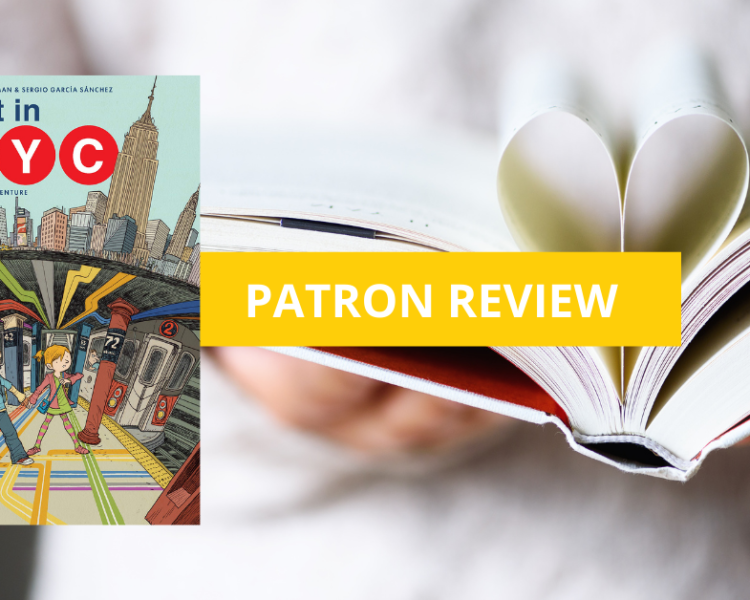Wondering how to learn about artificial intelligence? You may have seen movies featuring artificial intelligence, such as Terminator, Her, I, Robot, Ex Machina, and Wall-E. The term “artificial intelligence” has been floating around various media platforms, but what is artificial intelligence? And why is it important? How was it created? And how will it impact our society in the near future?
The literal definition of artificial intelligence is, “the ability of a computer to think and learn.” This means making machines process, think, and act the way humans do. AI can help identify and solve problems and provide mechanisms for decision-making. It is beneficial to various workplaces like the military and healthcare.
If you are looking to learn about artificial intelligence and how it will impact our society today and in the future, here is a list of what to read to learn about artificial intelligence. All these books are available to check out at the Orem Public Library.
Books to Read to Learn about Artificial Intelligence
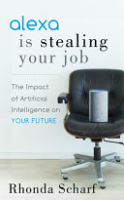
Alexa is Stealing Your Job: The Impact of Artificial Intelligence in your Future
By Rhonda Scharf
Adult Nonfiction
Alexa is Stealing Your Job is a compelling guide on how artificial intelligence may overtake your daily job. With the quick rise of artificial intelligence, a person’s entire job could be instantly replaced by a computer. Employees all around the globe are working even harder so their employers won’t replace them with a computer. Rhonda Scharf does a great job describing the negative effects of artificial intelligence, and the troublesome load that comes with AI. Times are changing and AI is just getting faster and smarter by the minute. Will it change our lives forever?
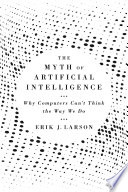
The Myth of Artificial Intelligence: Why Computers Can’t Think the Way We Do
By Erik J. Larson
Adult Nonfiction
Although AI is getting smarter every day, will it ever replace the work and thoughts of the human mind? The Myth of Artificial Intelligence is a novel about the myths and negative stigmas surrounding AI. The author, Erik Larson, is a tech entrepreneur as well as a scientist; he takes you on a research journey to learn more about artificial intelligence. Throughout the book, Erik Larson and other scientists use statistics, facts, and years of research to explain the myths and actual facts of AI. Larson’s research concludes that we are still very far away from superintelligence. Though AI is smart, it’s not smart enough to replace the human mind entirely.
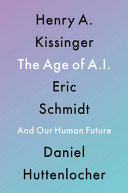
The Age of AI: And our Human Future
By Henry A. Kissinger, Eric Schmidt, and Daniel Hugtenocher
Adult Nonfiction
The authors Henry A. Kissinger, Eric Schmidt, and Daniel Hugtenocher discuss how artificial intelligence behaves and how it might change the human experience. They argue that AI will have a large impact on militaries, altering battle tactics and influencing the global balance of power. It may change our relationships with politics and the societies we live in. The book also argues that we need to be aware of AI, suggesting that we have to accept new information and develop safeguards to protect human roles. Since AI is very powerful it will be able to make decisions and predictions and interfere with people’s thoughts but at the end of the day it is still a technology which has weaknesses with concepts such as emotions, goals, and morality.
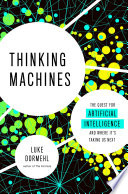
Thinking Machines : The Quest for Artificial Intelligence–and Where it’s Taking Us Next
By Dormehl
Adult Nonfiction
Dormehl is a technology journalist who understands the math and sciences about technology. In his book, Thinking Machines, he talks about the history of AI and how it influences our thinking today. It talks about the machines we use and how they are controlled by AI. It emphasizes how we can make machines think more like humans. Dormehl goes on to talk about how AI is learning at an extremely fast rate and how terrifying it can be for our future. He believes that machines have become tools to increase productivity in the work field and that computers are sometimes the best when it comes to routine tasks that repeat. He also points out the negative side. Even though AI is good for completing work, it might take people’s jobs in the future and leave people unemployed.
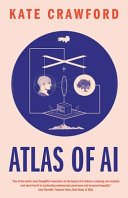
Atlas of AI : Power, Politics, and the Planetary Costs of Artificial Intelligence
By Kate Crawford
Adult Nonfiction
This book argues that AI is neither artificial nor particularly intelligent, with an amazing history of the data on which machine-learning systems are trained. Atlas of AI challenges us to re-evaluate the prevailing narratives surrounding the development and deployment of AI technologies. Crawford employs a multidisciplinary approach, combining scholarly research, case studies, and insightful visualizations to unpack the social-political, environmental, and ethical dimensions of AI systems. Her work prompts readers to critically question the prevailing narratives of AI as unbiased, neutral, and inherently progressive.The book suggests that the most worrisome impact of AI will be to natural resources, freedom, equality, labor, and privacy.
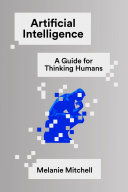
Artificial Intelligence : A Guide for Thinking Humans
By Melanie Mitchell
Adult Nonfiction
Melanie Mitchell’s book reports on AI’s extravagant promises and frustrating setbacks from a historical perspective. This book starts in the mid 20th century when artificial intelligence first appeared. The book examines how AI works as a deep learning machine from the earliest stages. Mitchell argues that AI has amazing features such as machine learning algorithms, ever-increasing computing power, and the availability of huge amounts of data, but we still live far away in our daily life. The second half of this sentence is vague; we live far away from what in our daily life? This book takes us on a journey about the ethical and societal implications of AI and its influences on the workforce and economy with various metaphors, analogies, and abstraction play.
Additional Sources on Artificial Intelligence
- Can Machines Think?
- artificial intelligence (AI)
- What is AI? Everything to know about artificial intelligence
Written by Aranza, Antonella, and Hoon (Library Volunteers)


